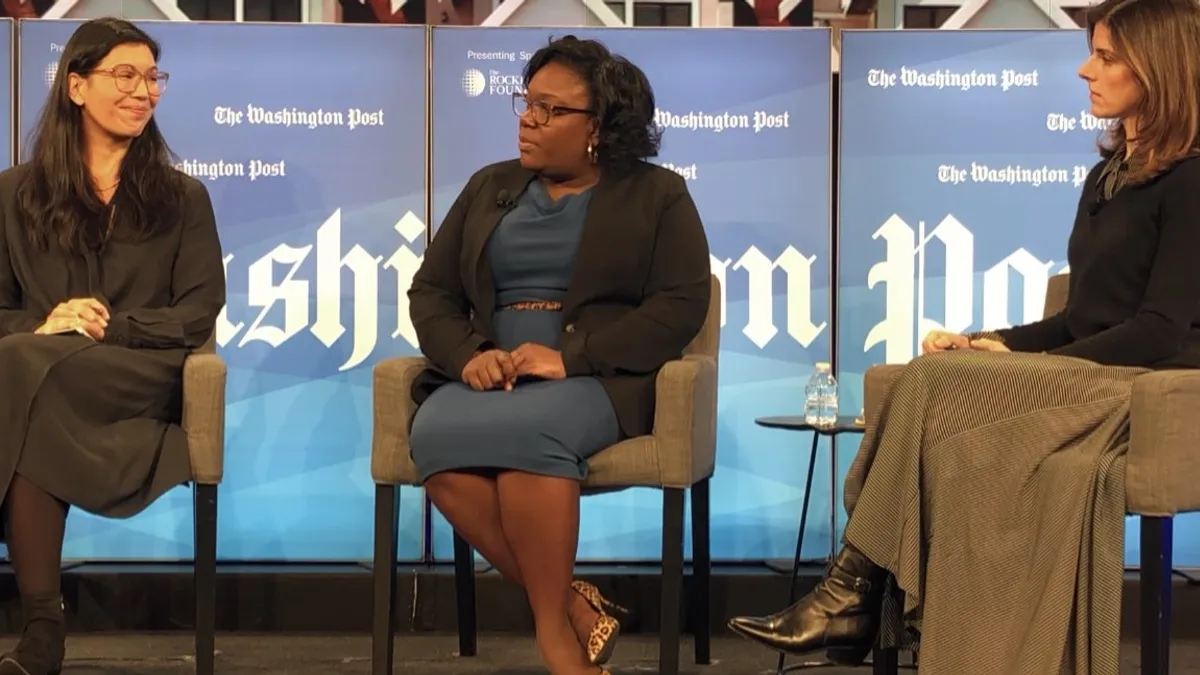WASHINGTON — The rising cost of childcare, ineffective parental leave policies and pay disparities make it hard for working families to make ends meet, said experts at The Washington Post Live "Working Families: The cost of the American dream" forum Feb. 26.
In panel discussions, academics, government officials and advocacy organization leaders addressed the problems facing families and possible solutions. A common thread throughout the program was the significance of working women. Melissa Bradley, co-founder of Ureeka and an adjunct professor at Georgetown University’s McDonough School of Business, said 80% of financial decisions are made by women and "single women, in general, drive the economy." Rajiv J. Shah, president of The Rockefeller Foundation, called working mothers the "engine of this economy."
According to the U.S. Census Bureau, women in the workforce earn about 80 cents for every dollar men earn; even when adjusted for occupation and education, a pay gap remains. Research by the National Women’s Law Center has found the gender pay gap is even wider for women of color. To earn more, most women have to work more, which makes work-life balance even more difficult as a parent.
"What can employers do to ease the burden and make both working and being a parent viable?" moderator Libby Casey, politics and accountability anchor at The Post, asked a panel of diverse women.
"It takes having women in leadership positions at companies," said Julianna Goldman, a former TV news journalist, and founder of MamaDen. Goldman said there also should be openness and transparency.
"You shouldn't feel like you’re in a job where you have to work like you don’t have any children," she said.
In 2018, Goldman wrote an essay published in The Atlantic that went viral, Casey said. Goldman detailed how she was pressed to choose between staying in her career in TV journalism and being a mom. "I chose the latter," she wrote.
‘A quality of life issue’
To help working mothers and families, Philadelphia Councilmember Kendra Brooks said she made parental and paid sick leave policy a priority by supporting legislation, under the Family Medical Leave Act (FMLA), that would require employers in Philadelphia to provide three months of paid time off for eligible workers to care for newborn child, a sick relative, or are suffering from a long-term ailment themselves. Brooks said the legislation would begin with large businesses, then scale down to mid-size and small businesses.
"It’s a quality of life issue," she said. "You can’t work well, if you don’t feel that things that are most important to you are secure. I’m hoping this legislation goes through and we’ll … set a new trend for Philadelphia and hopefully, eventually the nation."
Some movement has begun at the federal level as federal workers will now receive 12 weeks of paid leave for the birth or placement of a child, but there’s no federal law making paid family leave available to most American workers.
President Donald Trump has urged Congress to pass the Working Families Act, also known as the Cassidy-Sinema plan. The bill would allow individual taxpayers to receive an advance of up to $5,000 of their federal Child Tax Credit (CTC) during the year of the birth or adoption of a qualifying child. The legislation has been touted as a paid leave; however, it does not guarantee workers time off or job protection for those who do take leave.
Shah said during the event that expanding and modernizing CTC and Earned Income Tax Credit (EITC) would help working mothers. He said studies show the credits are two of the most effective tools for lifting families above the federal poverty line. The foundation has announced grants to several national organizations to raise awareness about the credits. Rep. Ro Khanna (D-CA) said he has been working on legislation called "The Cost of Living Refund Act," a "dramatic expansion" of EITC.
"It incentivizes employers to hire and people to seek jobs," Khanna said.












